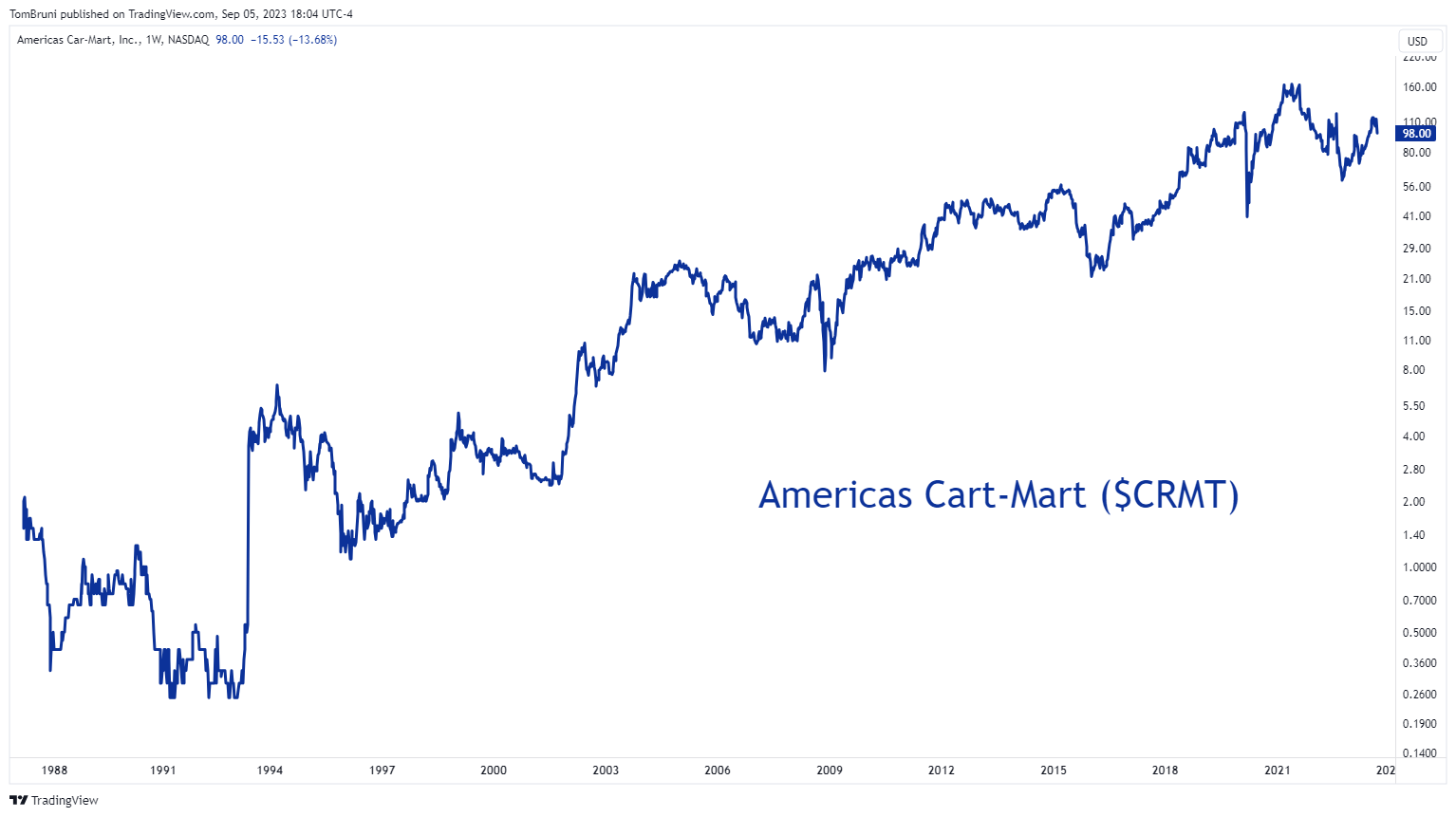Stocks came under pressure during today’s light-volume trading session as investors and traders returned from a long weekend. Let’s see what you missed while catching up on emails. 👀
Today’s issue covers America’s Car-Mart going off-road, Luckin Coffee back in the news, and more from the day. 📰
Check out today’s heat map:

3 of 11 sectors closed green. Energy (+0.53%) led, and materials (-1.85%) lagged. 💚
The Reserve Bank of Australia kept interest rates at 4.10% for the third straight meeting. Meanwhile, the Bank of Israel held rates steady for the second consecutive month but is keeping the door open for potential currency intervention to support a weakening shekel. And lastly, South Korea’s consumer prices unexpectedly jumped in August, signaling inflation may not be dead just yet. ⏯️
Crude oil and other energy commodities continued to rally after Saudi Arabia extended its voluntary cut of 1 million barrels per day until the end of 2023. Demand also remains strong as Wall Street continues cutting its recession odds. Goldman Sachs is the latest, reducing its forecast of a U.S. recession in the next 12 months to just 15%. 🛢️
The writers’ and actors’ strikes are keeping production halted, causing issues for TV and movie studio Warner Bros. Discovery. Executives say they expect an adjusted earnings impact of $300 to $500 million, which may be better than anticipated given shares surprisingly jumped on the news. ❌
NextGen Healthcare pumped 6% on news that private equity firm Thoma Bravo is outcompeting its peers in bidding for the company. 💰
Airbnb jumped 7%, and Blackstone rose 4% on news they’ll be added to the S&P 500 index soon. 📈
United Airlines lost altitude today after a computer issue briefly grounded its fleet nationwide. 🛬
Other symbols active on the streams: $AMC (+4.12%), $TTOO (-1.14%), $MULN (+5.95%), $HSDT (+33.50%), $MSOS (+18.65%), $AULT (+10.48%), $NVOS (+35.81%), and $GNS (+13.08%). 🔥
Here are the closing prices:
| S&P 500 | 4,497 | -0.42% |
| Nasdaq | 14,021 | -0.08% |
| Russell 2000 | 1,880 | -2.10% |
| Dow Jones | 34,642 | -0.56% |
Company News
Lattes Fuel Luckin Coffee’s Jump
Chinese coffee company and coffeehouse chain Luckin Coffee is back in the news after flying under the radar for the last two years. But don’t worry, it’s not for a bad reason this time. 👍
For those unfamiliar with the company, it was best known for coming public on the Nasdaq stock exchange in May 2019 and being rocked by an accounting scandal shortly after. In early 2020, investigative investment firm MuddyWatersResearch published a report that indicated the company had heavily inflated its sales numbers. 🕵️♂️
That investigation caused more investors to look into the company as the COVID-19 pandemic began, forcing Luckin to shut down most of its stores. Ultimately, an internal investigation found that former COO Jian Liu had committed and hidden fraud, and the stock’s decline caused co-founder Charles Lu to default on a margin loan collateralized by Luckin shares.
As the issues mounted, the company was fined by the Securities and Exchange Commission (SEC) and Chinese regulators, leading to a Chapter 15 bankruptcy filing in February 2021. That allowed it to retrench its operations, settle existing claims, and reach a global settlement of $187.5 million with its angry shareholders. 📝
Since then, CEO Jinyi Guo has been leading the turnaround efforts, with the company reestablishing itself in China and now looking to expand into other countries. Additionally, it’s looking to regain its listing on the Nasdaq, currently trading in the “over-the-counter” (OTC) market in the U.S.
Anyway, as for why the company was trending today. Well, it was coffee sales for a change. ☕
The company recently launched a new partnership with Kweichow Moutai to bring an alcohol-infused latte to its stores. The product set a record on its launch day, selling more than 5.42 million cups. That topped previous hits such as its cheese latte and coconut cloud latte, which sold 1.31 million and 660,000 cups, respectively.
$LKNCY shares rose more than 5% today as the company continues its steady ascent. 📈

Earnings
America’s Car-Mart Goes Off-Road
The small-cap automotive retailer operates in the integrated auto sales and finance segment of the used car market. 🚗
America’s Car-Mart saw revenues jump 8.6% YoY to $368 million, narrowly topping estimates. Meanwhile, adjusted earnings per share of $0.63 missed expectations of $0.98.
Looking at volumes, the company’s customer count rose 8.1% to 104,734 active customers. Total retail unit sales rose 2.4%, with a growth of 8.2% for same-store retail revenue. And sales volume productivity per store per month was 34.2 vs. 33.6, a 1.8% increase. 📊
Turning to profitability, gross profit per car sold rose 3.74% to $6,768. Additionally, gross margins increased 260 bp to 36%, with executives now expecting future gross margins above previous guidance. However, the company’s provision for credit losses as a percentage of sales rose to 30.9%, as net charge-offs continue to rise amid its core customer base.
The higher loan loss provisions overshadowed improvements elsewhere in the business. This figure is returning to pre-pandemic levels, stressed by longer contract terms and a higher average interest rate for the portfolio of loans. ❌
Essentially, more expensive cars have caused customers to finance their purchases at less favorable terms. And as the economy slows and/or used car values fall, delinquencies become more likely.
The automobile market continues to be a tough one for retailers. Demand is pressured by high automobile prices and financing rates, while low inventories and higher repair and replacement costs pressure supply. If the economy weakens, the demand side of the equation will only get more difficult and likely see loan delinquencies tick up further. 😬
$CRMT shares fell 14% on the day, now sitting at the same levels as early 2019. With that said, like many of its peers, its longer-term trend remains higher. 🙃

Bullets
Bullets From The Day:
🪙 Countries continue to woo tech investment with incentives. Indonesia has given the founder of OpenAi, Sam Altman, a “Golden Visa” lasting ten years. He’s expected to help grow the country’s artificial intelligence (AI) ecosystem, so this incentive will give him priority screening at airports, longer periods of stay, and ease of entry and exit. CNBC has more.
❌ Strikes (or threats of) continue spreading across industries. The oil and gas industry is the latest to experience its workers leveraging a tight labor market for better compensation. At Chevron’s Gorgon and Wheatstone liquefied natural gas (LNG) projects in Australia, employees are planning a two-week strike as the dispute over pay and conditions continues. The country is the world’s biggest LNG exporter, with these two projects accounting for more than 5% of current global LNG capacity. More from Reuters.
🤑 Chip design firm Arm gears up for $52 billion IPO. It submitted an updated filing for its initial public offering on the Nasdaq stock exchange, setting a price range of $47 to $51. With that said, only 9.4% of the company’s shares will be freely traded on the Nasdaq. It was previously listed in London and New York but acquired by SoftBank for $32 billion in 2016. CNBC has more.
🏭 China boosts domestic semiconductor industry amid sanction pressures. The United States and other Western countries have tried to limit China’s chip production as the “technological race” of the current century continues. However, the government is battling back by raising $41 billion through its China Integrated Circuit Industry Investment Fund to support domestic production and advancement. It comes just days after Chinese electronics company Huawei announced its new smartphone with domestically made semiconductors. More from Engadget.
📝 New Airbnb rules in NYC are a big deal for all cities. The “Big Apple’s” new regulations for Airbnb, Vrbo, and similar platforms could have broader consequences for the vacation rental industry. The company called it a “de facto ban,” as the rule requires hosts listing their properties for short-term stays to register with the city or face up to a $5,000 fine. The rule is meant to help enforce the prohibition against rentals of fewer than 30 days unless the host is present and with a maximum of two guests, which is largely ignored. Axios has more.
Links
Links That Don’t Suck:
😱 UAW strike looks “highly likely” when contract ends Sept. 14
🏢 Return-to-office is a $1.3 trillion problem few have figured out
😠 Musk threatens to sue ADL after blaming it for X ad sales slump
🚗 Is the era of inexpensive cars over? Why auto prices are on the rise in America
*3rd Party Ad. Not an offer or recommendation by Stocktwits. See disclosure here.


